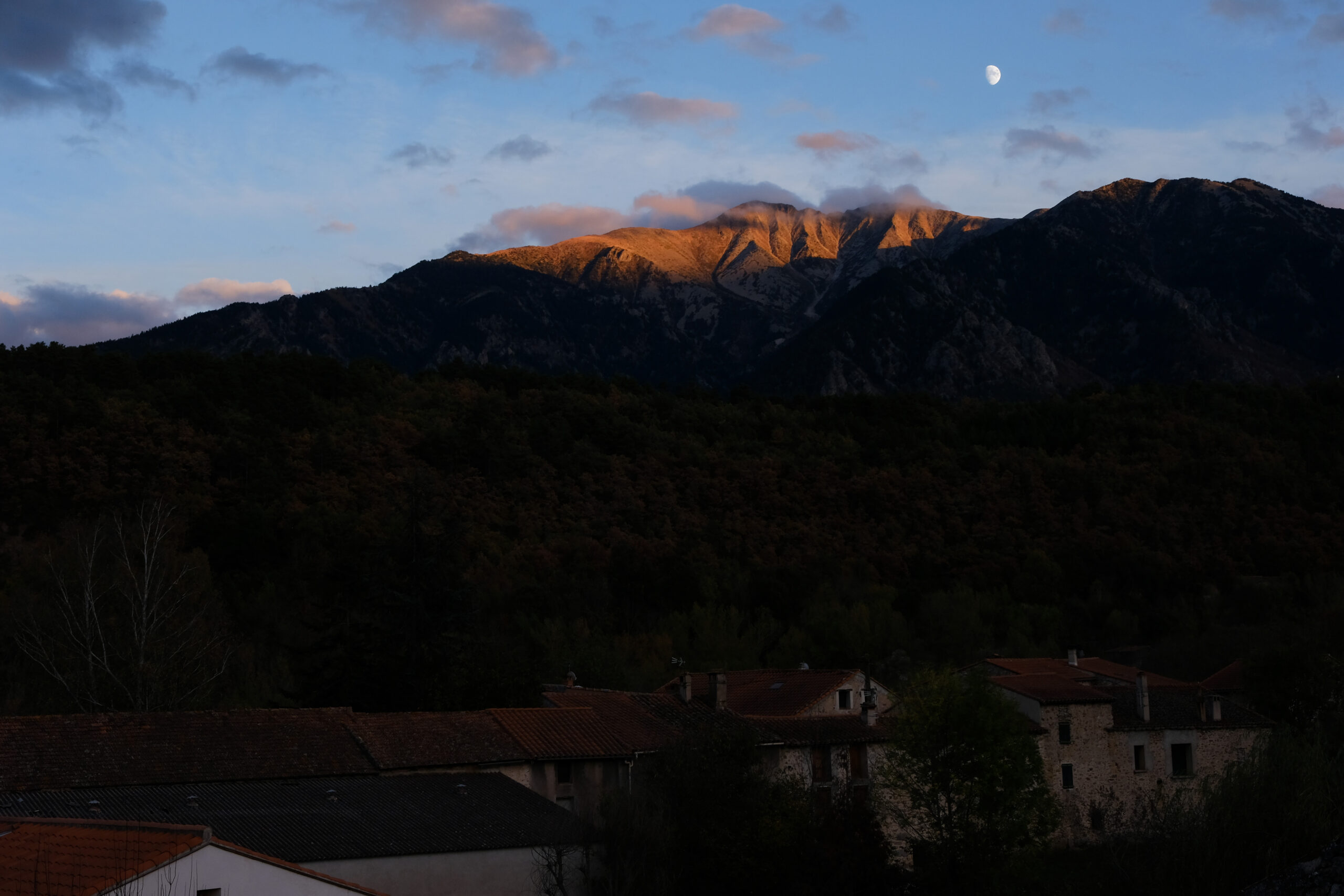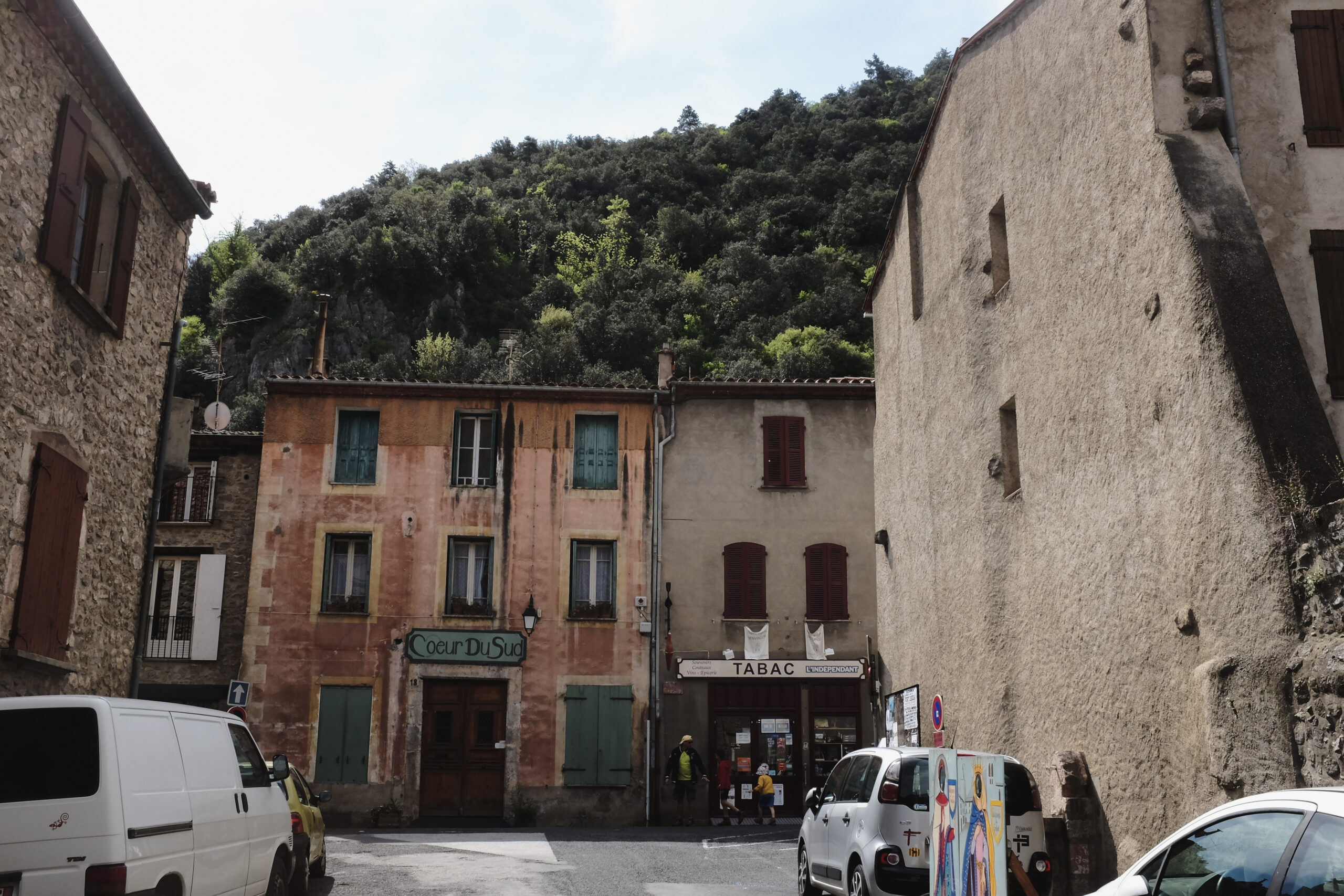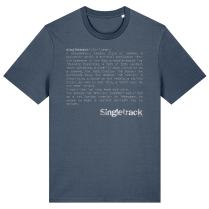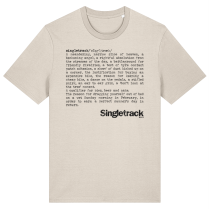Last year, Chipps chucked (most of) it all in and moved to a small village in the French mountains. But how do you say ‘Show me to the good trails!’ in French?
Words & Photography Chipps
It’s been a busy old couple of years. Since January 2021, I got engaged, we sold our draughty old Yorkshire farmhouse, got married, threw away a lot of junk, packed a van and moved to the French Pyrenees. In the last 12 months, I’ve had an extreme version of the situation everyone finds themselves in when they move somewhere new, namely: what day do the bins go out, what day is the hardware shop open and… where are the good mountain bike trails? Only in French.
Latest Singletrack Merch
Buying and wearing our sustainable merch is another great way to support Singletrack
Starting again
Whether you’ve just moved to the next town over or packed everything into a van and driven until the weather improved, it’s a similar situation. You’re starting from nothing and need to work out where to ride, how to leave town by the back roads and where the fun stuff is.
Hopefully you’ve moved to a place where you’ve heard the riding is pretty decent, but where do you start in trying to become an all-knowing trail guru? Unless you’ve moved to a house underneath Morzine’s main chairlift, or the final corner of The Golfie, you’ve got a hell of a lot of learning to do about the trails and the local scene. You also need to work out how best to fit in, too. And given that early impressions can have lasting effects, there are definitely good and bad ways of going about being the newcomer in town.
For my part, I have moved with my wife Beate to a little place called Fuilla, in the southeastern Pyrénées-Orientales – about as far south as you can get in France. It’s a sleepy village of 450 people at about 600m altitude, sitting in a wide, grassy valley surrounded by wooded hillsides east and west, a rocky wall to the north, and behind… well, things just keep going uphill until you get to the Spanish border.

While it was initially daunting, it wasn’t too different from my original move from Wiltshire to West Yorkshire in 2001 when we started Singletrack Magazine. Back then, I’d arrived with a couple of bikes, no money, a couple of maps and, arguably, only a shaky grasp of the local language. Similarly, here in France, we initially knew no one, but there seemed to be the promise of bike riding in all directions and there surely had to be some local riders. Hopefully they wouldn’t mind sharing their trails and trail knowledge with us.
The one year rule
I have a theory that when you move somewhere, you get around one year of ‘Ooh, what’s down there?’ or ‘I’m off to see if this path on the map actually exists’ trail-finding enthusiasm. As well as self-guided exploration, you sign up for group rides, you highlight potential routes on your local map, you look at Strava heatmaps, Google Earth photos and YouTube videos for trails that you don’t know yet, but would like to meet…
After a year or so, I think that sense of exploration fades. By then, you’ll have a good grasp of the local riding and can weave together enough loops to keep you happy in any weather and state of enthusiasm or tiredness. You know that there are probably some more good tracks over there but you’ll get round to that some other time. But you won’t. It’ll take someone else new moving in, taking what you’ve learned and building on top of it with their newcomer experience for you to find what’s over that hill.
With that in mind, I was keen to get a move on and get exploring, so even while we were unpacking, I’d make time to get out and ride. Fortunately, some trails had already been marked out for mountain bikes; most French villages will have a web of trails marked out for bikes by the local cycling club and promoted by the tourist information office. Unfortunately our local club appeared to have folded, but most of the signs remained as did a couple of marked-out maps. But there must be more? You know… the REALLY good stuff.

Even somewhere as trail-rich as the Southern Lakes, or Verbier, if you just had a taster week where someone showed you all of the must-do trails you could fit in, you’d have a huge base to start your explorations with. But who has that kind of time to show you? That’s exactly the reason you pay a guide.
In lieu of getting my own guide, I resolved to explore every avenue to trail nirvana, with every lunchtime dedicated to adding a single new trail to my repertoire. Sometimes this worked, other times it was a brambly disaster.
Those new people at number six
It doesn’t take long before you get known as ‘Those new people who live in that house with all them bikes’. Even the most discreet rider gets clocked, especially in a small village. We soon found ourselves buttonholed for occasional bike advice and repairs. Just having something as simple as a pedal spanner or lockring tool to lend out to a neighbour could mean the difference between someone being able to get a bike going, or having to take an afternoon off to drive to the distant bike shop.
In bigger towns, finding some like-minded cycling locals is often a case of picking the bike shop that you feel comfortable in and just making yourself a nuisance, asking about local rides and getting any tips on popular trails. Some shops will have rides that go from the shop, others have maps of suggested local loops.

Unfortunately, our nearest shop is a half-hour drive away. So our hopes of a local scene were dashed there, but we soon started hearing about this guy called Régis… ‘Have you met Régis yet?’, ‘I hear that Régis is eager to meet you’.
It turns out that Régis is the Deputy Mayor of the village and a keen mountain biker – one of perhaps three riders in the village. He soon found me through Strava, as my explorations took me on to some well-worn local favourites, and it’s easy to spot if you’re ‘2 of 2’ on a particular trail. He suggested a ride and we went from there.
Régis speaks very little English and my French is very scruffy, so our early rides were fairly quiet, punctuated by bursts of painstakingly constructed sentences, but as time has gone on, they’ve become far more lively. He was happy to have found a pair of willing ride pals in Beate and me, who could often juggle their work schedules to be free on a random Tuesday afternoon, or whenever his ‘proper’ shift job of working for the local train company allowed him some free time. And in return, he made sure that every ride was one we’d never done before.

Parlez-vous bike?
Having a common pastime, and even a common love of the outdoors here puts you in good stead and helps greatly with learning the language. In fact, having a common hobby means that you soon learn the words for bits of bikes, for hairpins, ruts and roots, hot and cold, mud and gravel. And, as many riders worldwide spend their entire rides just talking about bikes, it gives you a deep well of language to dip into that keeps the chat moving along.
In the vein of a true village statesman, Régis knows nearly every trail, every landowner and what days to avoid the forest when the boar hunting is on. He also loves a tasty descent, and so his route guidance is invaluable. He noted where I’d been riding and suggested new trails I wouldn’t have done before. He also has friends among the farmers and boar hunters, who often clear overgrown trails in the hills for ‘la chasse’, and in the weeks following this activity we’d see him heading off to see if the trails they’d rediscovered were worth adding to his trail knowledge.
Luckily for us, too, Jean-Francois, the village’s mayor is equally keen to see Fuilla earn a good reputation as a mountain bike destination. Tourist euros go a long way here, from the campsite to the café and the local accommodation tax.

Wanting to show off what we have here, Régis had arranged a ‘VTT Randonnée’ in June. Three different marked loops of the local trails, from 15km to 33km, feed stops (with wine!) included, all for a token €7 for the rides, or €15 in total if you wanted a slap-up meal (with wine, of course) after the event. Over 150 riders turned up from all over the region. For many, it was a chance for one of those ‘best of’ tours of trails they’d not explored here.
We quickly volunteered ourselves to help with marking and ‘cleaning’ the course of brambles and branches and chaperoned the final riders home. We were pleasantly surprised to find that our meals at the finish were on the house as we were considered ‘organisers’. We seemed to have cemented our reputations as village ‘doers’ – something that helps integration anywhere, be it in France or Folkestone. Regardless of country or region, there are always a few community doers. You see the same people manning the sign-on table at the local bike race, or encouraging the Hallowe’en displays for the children. The more you lean into making a bit of effort, the more you get out of it – especially being new folks in the village.
No dig, no Strava
Something I feel strongly about is that you need to work out the subtleties of the local riding ‘scene’ before you wade in and start mixing things up by posting roost videos and publicising ‘new’ routes online. In a year here, I’ve not put up a single Strava segment, because I wanted to wait and see what the local riding atmosphere was like. This isn’t an Alpine resort with a hundred trails and thousands of riders and Strava segments. There will always be someone more ‘local’ than you are, and there may be reasons that the classic local track isn’t on Strava. Perhaps it’s a contentious one, or private, or it’s not finished yet, or it’s very weather sensitive and impassable half of the year. Or maybe sometimes it’s fenced off and full of grumpy cattle, so you need to check every time.

The same goes for trail building and ‘improving’. A secateur clipping here and there, or kicking out some puddles, is a far cry from digging in a few cheeky bus stops, or blazing a completely new trail through an old forest. How each trail and hillside is used is something that I think needs a complete understanding of local access, ownership and responsibility. One person’s ‘unloved scrubland’ is often a naturalist’s rare, untouched, SSSI old-growth forest.
It’s usually the case that the worst, or most visible bits of amateur/teenage trail digging are in the closest woods and parks to town, which means they’re seen by the biggest group of dog walkers and grumpy folks and, therefore, cause the biggest ruckus. Find the right overgrown trail, however, perhaps one that’s fallen into a cycle of neglect and disuse, and things literally open up. Reopening a thorny, impassable trail that needs a full waxed-cotton Barbour survival suit, machete and armoured gloves to approach will probably earn you the thanks of everyone: walker, equestrian and mountain biker. Those, by their nature, are rarely an easy walk from home. Luckily e-bikes now make travel to this kind of remote outpost, carrying all of the gear, possible. Something I’ve been making the most of.
What now?
The dust is now settling on our crazy couple of years and our first year in France will be done by the time you read this. We’ve sold our place in the UK and we’re here for good. Our knowledge of the local trails is slowly expanding. And, as the saying goes, the more you know, the more you know. There comes a tipping point where the end of ‘that trail’ joins the start of that new one you found and you discover that you can link loops together, unconsciously adjusting for time, weather, riders and what’s for tea to make the perfect ride. It’s a kind of trail fluency that can’t be rushed.

I’m getting there. And my trail fluency is better than my French, but I feel that with both, a bit of sitting back and observing before wading in, has paid dividends. I’m still waiting for the crushing realisation to hit that I’ve made a permanent move to another country, thousands of miles away from my friends and family. I just have to remember that we’re still learning – the language, the opening hours, the tax systems, traditions and just how to live where we live.
It’s not unlike my move to Yorkshire from the southwest. Initially, to strangers in the pub, I was ‘That new lad, with the funny accent, doing that magazine’ but that eventually evolved into ‘Oh, you run that magazine and organise the bike race in the park, you fixed my neighbour’s bike wheel’ and ‘You came and helped my neighbour after the floods’ – it’s all incremental, every stranger starts somewhere… and just like in Yorkshire, give it another couple of decades and we might yet qualify as ‘locals’.
Essential French with Frites Chippendale
- Roots – racines
- Ruts – rigoles
- Big rocks – roches
- Stones – pierres
- Gravel (big) – cailloux
- Gravel (small) – gravier
- Mud – boue
- Slippery – glissant
- Steep – raide
- Corner – virage
- Hairpin – epingle
- Puncture – pneu crevé
Phrase Book
Vélo Tout-Terrain (VTT): Mountain Bike [MTB]
Un gâteau ? Pourquoi un seul ?: A cake! But why only one?
C’est quoi ce truc sec ? Nous les anglais, on préfère la boue…: What is this dry stuff? We’re British and prefer the mud.
Vous parler du Brexit ? Non. C’est trop d’ émotion…: I don’t want to talk about Brexit. It’s too emotional.
Je crois bien que je me suis empalé sur le frein à main. Vous savez où est l’hôpital ?: I appear to have impaled my hand on the brake lever. Which way to the hospital?









